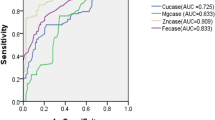Abstract
Trace element deficiencies have been documented to play an important role in determination of the fetal outcome. Pregnant women in developing countries have been reported to consume diets with a lower density of minerals and vitamins. Deficiencies of trace elements like zinc, copper and magnesium have been implicated in various reproductive events like infertility, pregnancy wastage, congenital anomalies, pregnancy induced hypertension, placental abruption, premature rupture of membranes, still births and low birth weight. The present review article highlights the important of role played by zinc, copper and magnesium during pregnancy and its outcome. The role of individual trace elements and in combination with other trace elements has not been completely documented. There is a need to undertake further studies in this field.
Similar content being viewed by others
References
Yasodhara P, Ramaraju LA, Raman L: Trace minerals in pregnancy 1.Copper and Zinc Nutr Res 1994; 11: 15–21
Leela Raman, Veena Shatrugna. Nutrition during pregnancy and lactation. In Mahtab S. Bamji, N. Prahlad Rao, Vinodini Reddy, eds.Textbook of Human Nutrition. New Delhi, Oxford and IBH Publishing Co. Pvt. Ltd. 2002; 509.
WHO Trace elements in human nutrition and health. Geneva, WHO press 1996; 72–104.
Black RE. Micronutrients in pregnancy.Br J Nutr 2001; 85: S193-S197
Goel R, Misra PK. Study of plasma zinc in neonates and their mothers.Indian Pediatr 1982; 19: 611–614.
Tamura T, Goldenberg RL, Johnston KE, DuBard M. Maternal plasma zinc concentrations and pregnancy outcome.Am J Clin Nutr 2000; 71: 109–113.
Duncan JR. Zinc nutriture in pregnant and lactating women in different population groups.S Afr Med J 1988; 73: 160–162.
King JC. Determinants of maternal zinc status during pregnancy.Am J Clin Nutr 2000; 71: 1334S-1343S.
O’Brien KO, Zavaleta N, Caulfield LE, Wen J, Abrams SA. Prenatal iron supplements impair zinc absorption in pregnant Peruvian women.J Nutr 2000; 130: 2251–2255
Personal communication: Prof Tara Mehta, Department of Biochemistry. M.S. University. 1998.
Osendarp SJ, Van Raaji JM, Darmstadt GL, Baqui AH, Hautvast JG, Fuchs GJ. Zinc supplementation during pregnancy and effects on growth and morbidity in low birth weight infants: a randomized placebo controlled trial.Lancet 2001; 357: 1080–1085.
Bhaskaram P. Zinc deficiency.Indian Pediatr 1995; 32: 1153–1156
Gopalan C, Ramashastri BV. Nutritive Value of Indian Foods, Hyderabad, National Institute of Nutrition — Indian Council of Medical Research Press, 2002; p 156
Mahomed K. Zinc supplementation during pregnancy.Cochrane Database Syst Rev 2000; 2: CD000230
Olivares M and Uauy R. Copper as an essential nutrient.Am J Clin Nutr 1996; 63(S): 791–796
Raman L, Leela J. Role of maternal Nutrition. In PIH Annual Report National Institute of Nutrition, 1992; 93: 47–50.
Ebbs JH, Tisdall FF, Scott WA. The influence of prenatal mother and child.J Nutr 1991; 22: 515–526
Creizel AE. Nutritional supplementation and prevention of congenial abnormalities.Curr Opin Obstet Gynecol 1995; 2: 88–94
Buamah PH, Russell M, Milford-Ward A, Taylor P, Roberts DF. Serum copper concentration significantly less in abnormal pregnancies.Clin Chem 1984; 30: 1667–1670
Morten MS, Elwood PC, Abernethy M. Trace elements in water and congenital malformations of the central nervous system in South Wales.Br J Prev Soc Med 1976; 30: 36–39.
WHO Prevalence of anemia in women: A tabulation of available information. 2nd Edition, Geneva, WHO press, 1992
Anand S, Mittal R, Bhargava U, Vir SC. Copper status of Indian pregnant women of low socioeconomic group and its effect on the outcome of pregnancy.Int J Vietnam Nutr Res 1981; 51: 410–415.
Grollman, A, Grollman EF.Pharmacology and Therapeutics. 6th edn. Lea, Philadelphia, 1965; 1002–1009.
Chien PFW, Khan KS, Arnott N. Magnesim sulphate in the treatment of eclampsia and pre-eclampsia: an overview of the evidence from randomized trials.Brit J Obstetrics and Gynecology 1996; 103: 1085–1091
Fawcett WJ, Haxby EJ, Male DA. Magnesium: physiology and pharmacology.Br J Anaesth 1999; 83: 302–320
Almonte RA, Heath DL, Whitehall J, Russell MJ, Pathole S, Vink R. Gestational magnesium deficiency is deleterious to fetal outcome.Biol Neonate 1999; 76: 26–32
Doyle W, Crawford MA, Wynn AH, Wynn SW Maternal magnesium intake and pregnancy outcome.Magnes Res 1989; 2: 205–210
Conradt A, Weidinger H, Algayer H. Magnesium therapy decreased the rate if intrauterine fetal retardation and premature delivery in risk pregnancies treated with betamimetics.Magnesium 1985; 4: 20–28.
Sibai BM, Villar MA and Bray E Am. Magnesium supple-mentation during pregnancy: a double blind randomized controlled clinical trial.J Obstet Gynecol 1989; 161: 115–119.
Spatling L and Spatling G. Magnesium supplementation in pregnancy: A double blind study.Br J Obstet Gynaecol 1988; 95: 120–125.
Sawhney H, Aggarwal N, Biswas R, Vasishta K, Gopalan S. Maternal mortality associated with eclampsia and severe preeclampsia of pregnancy.J Obstet Gynaecol Res 2000; 26: 351–356
Begum R, Begum A, Bullough CH, Johanson RB. Reducing maternal mortality from eclampsia using magnesium sulphate.Eur J Obstet Gynecol Reprod Biol 2000; 92: 222–223.
Lu JF, Nightingale CH. Magnesium sulphate in eclampsia and pre-eclampsia: pharmacokinet principles.Clin Phamacokinet 2000; 38: 304–314
Makrides M, Crowther CA. Magnesium supplementation in pregnancy.Cochrane Database Syst Rev 2000; 2: CD000937
Turnlund JR. Copper. In Shils ME, Olson JA, Shike M, eds.Modern Nutrition in Health and Disease 8th edn. Philadelphia Lea and Febiger, 1994; 231–241.
Arikan GM, Panzitt T, Gucer F, Scholz HS, Reinisch S, Haas Jet al. Course of maternal magnesium levels in low risk gestations and in preterm labor and delivery.Fatal Diagn Ther 1999; 14: 332–336.
Author information
Authors and Affiliations
Corresponding author
Rights and permissions
About this article
Cite this article
Pathak, P., Kapil, U. Role of trace elements zinc, copper and magnesium during pregnancy and its outcome. Indian J Pediatr 71, 1003–1005 (2004). https://doi.org/10.1007/BF02828116
Issue Date:
DOI: https://doi.org/10.1007/BF02828116




